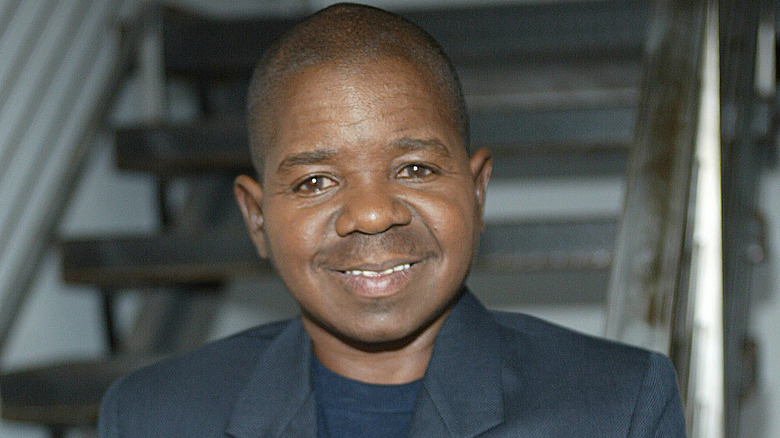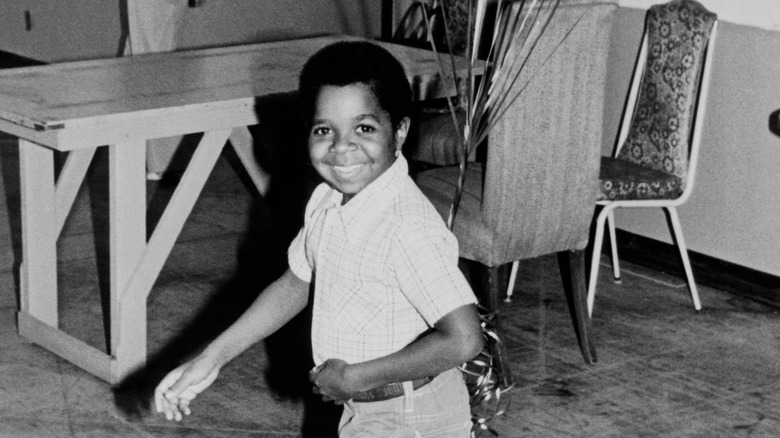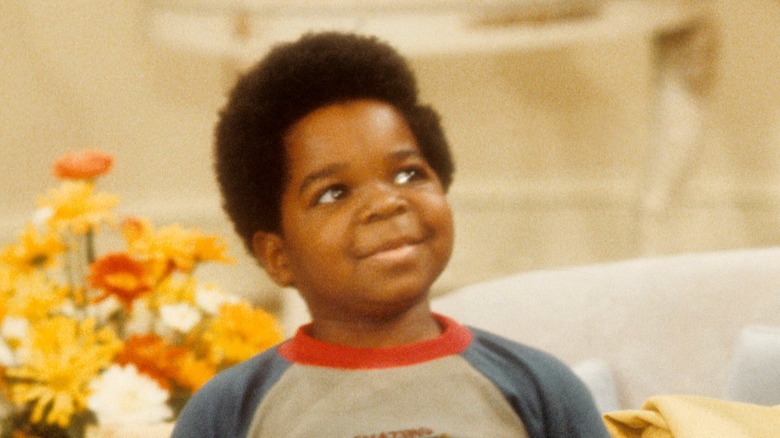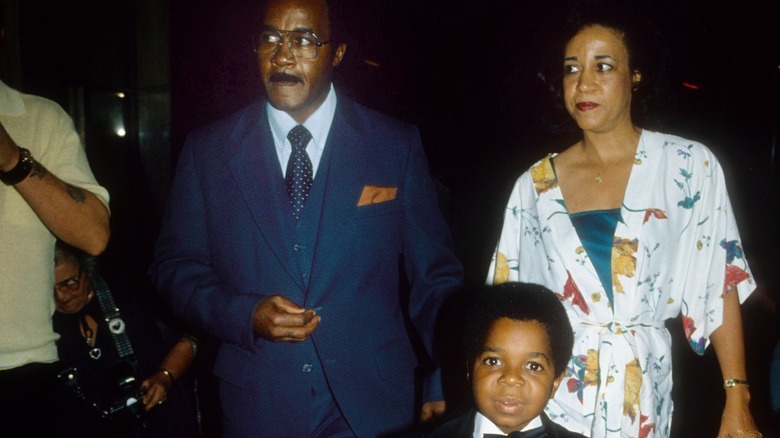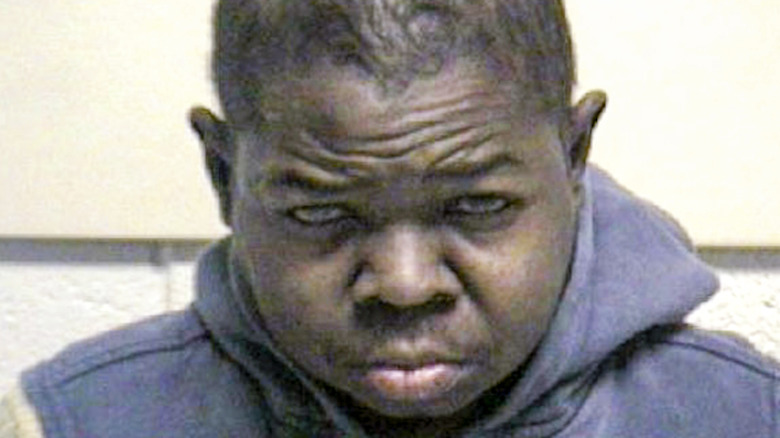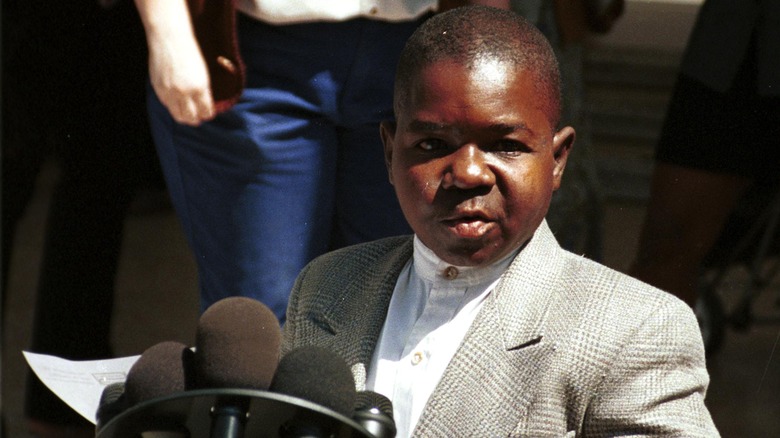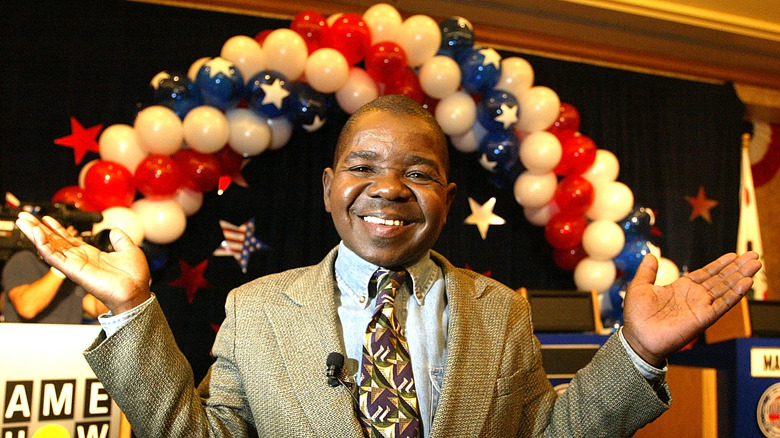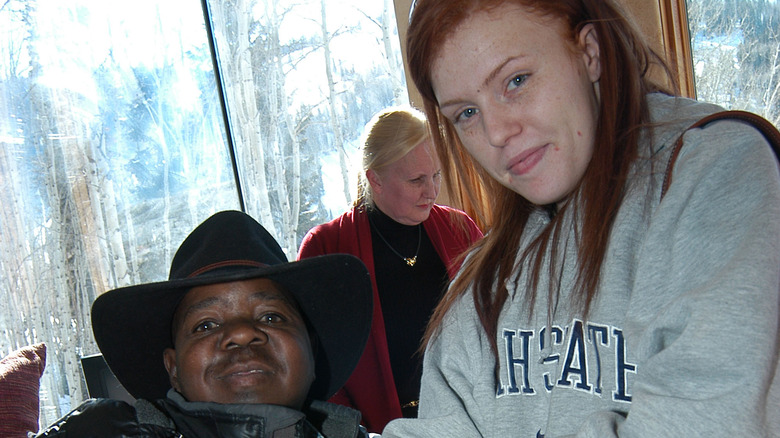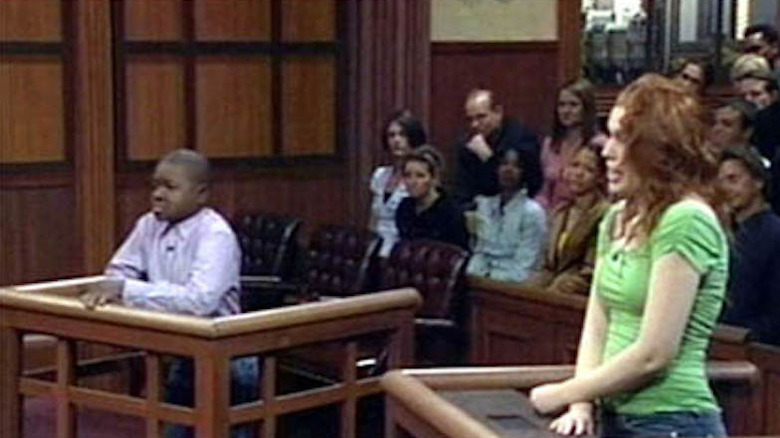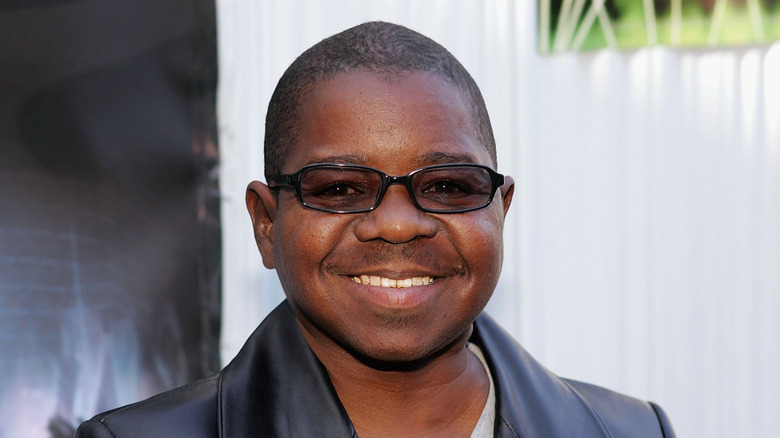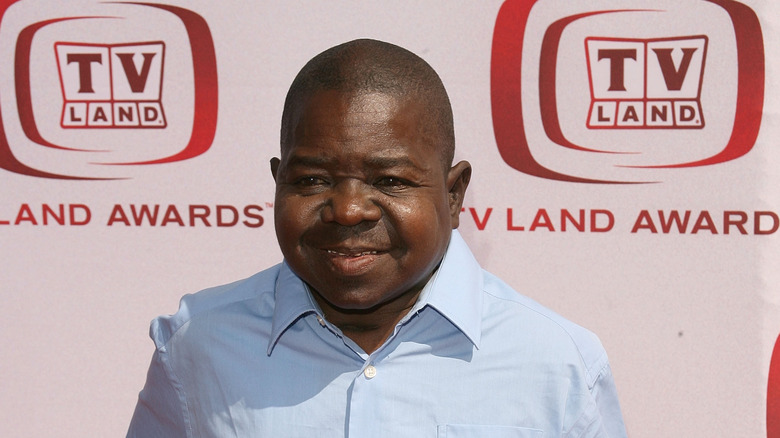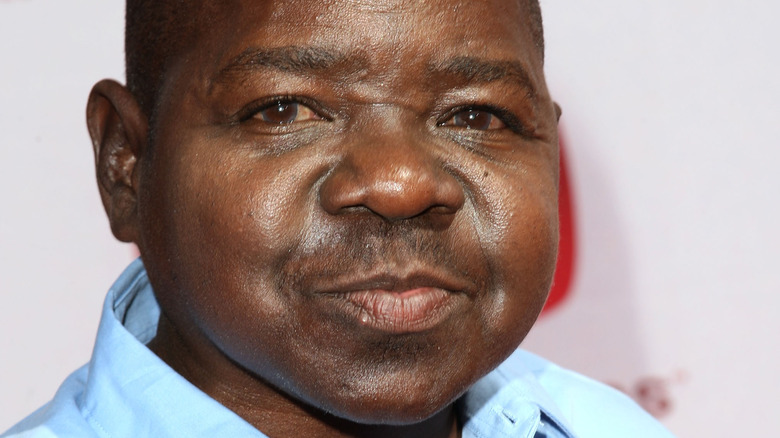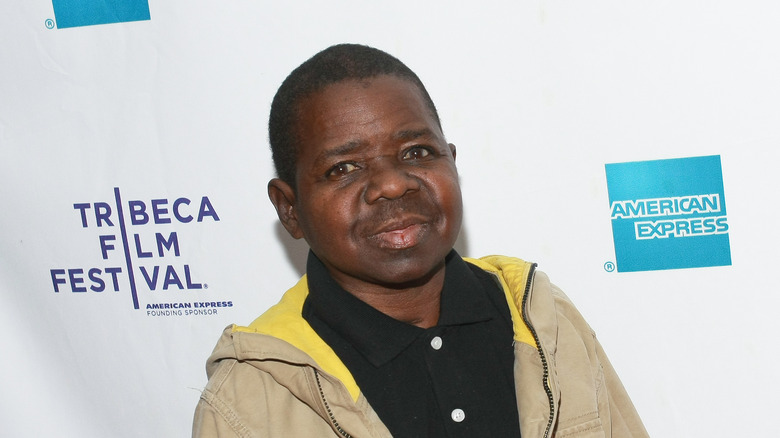Tragic Details About Gary Coleman
For the millions of viewers who tuned in each week to watch hit NBC sitcom "Diff'rent Strokes," Gary Coleman was the reason. Arguably one of the most successful child stars of the late 1970s and early 1980s, Coleman's beyond-cute recitation of his catchphrase — "What'choo talkin' 'bout, Willis?" — was instantly recognizable, his tiny body barely containing a larger-than-life personality. Looking from the outside in, Coleman had seemingly hit the Hollywood jackpot with a hit TV show, fat paycheck, and the kind of fame most people can only dream about. Coleman himself, however, looked at his childhood very differently. "I would not give my first 15 years to my worst enemy, and I don't even have a worst enemy," Coleman told The Associated Press in a 2001 interview.
As everyone now knows, Coleman and his young co-stars on "Diff'rent Strokes" — Dana Plato and Todd Bridges — did not exactly lead charmed lives after the show ended its run: Bridges went through a protracted battle with substance abuse, ultimately turning his life around; Plato experienced similar struggles but tragically died of a drug overdose at age 34.
While Coleman didn't dabble in drugs, his post-"Diff'rent Strokes" life proved to be a difficult road, full of health woes, relationship problems, money problems, and the indignities faced by someone whose professional peak occurred before experiencing adolescence. To learn more, read on to discover tragic details about Gary Coleman.
The star was born with serious health issues
Gary Coleman was born in 1968 and adopted when he was four days old by W.G. "Willide" Coleman, a pharmaceutical sales rep, and wife Sue, who worked as a nurse practitioner. Coleman entered the world with the deck stacked against him, diagnosed at birth with an array of health problems. Chief among these, however, was nephritis, a congenital defect of the kidney that was so serious that he underwent dialysis for much of his life. He was also the recipient of two kidney transplants, the first when he was just 5, and another when he was 16 after the first donor kidney failed. Because of his medical condition, Coleman once joked to People (via CNN) that he ingested "so many pills a day, you'd think I'd rattle."
Coleman's kidney ailment also hindered his growth, making him appear perpetually younger than he actually was during childhood. By the time he was a fully grown adult, Coleman's height was just 4-foot-8.
What viewers surely didn't realize was that Coleman was often seriously ill while taping "Diff'rent Strokes." Speaking with "The Young Turks," his "Diff'rent Strokes" co-star Todd Bridges blasted Coleman's parents, recalling how sick Coleman became when his body was rejecting a donor kidney. "And they actually had this boy working," Bridges recalled. "He was throwing up, deathly ill, looking like he was death warmed over, and I started crying because I couldn't believe his parents were forcing him to work."
The actor struggled to find work as an adult
The meteoric success of "Diff'rent Strokes" rested almost entirely on the tiny shoulders of Gary Coleman, and everyone knew it. That led him to become one of television's highest-paid stars of his era. When he was first hired, Coleman earned $1,500 per episode; his salary eventually ballooned to $70,000 an episode. When "Diff'rent Strokes" was cancelled in 1986, Coleman was 18 years old and had earned an estimated $18 million.
Under normal circumstances, the star of a hit TV series that had been on the air for nearly a decade should have their pick of lucrative projects. Coleman, however, had not only become so identified with his character, he was — from a Hollywood casting agent's perspective, at least — an adult trapped in the body of a child. As a result, he struggled to find acting work during the years after "Diff'rent Strokes." In fact, in the decade after the series ended, Coleman only amassed a dozen or so screen credits, mainly one-off guest spots of TV shows — including reprising his "Diff'rent Strokes" character on "The Fresh Prince of Bel-Air."
"Face it, there just aren't that many jobs out there for a four-foot, eight-inch Black man," Coleman's former agent, Vic Perillo, told the Los Angeles Times, addressing his one-time client's inability to find work.
Gary Coleman's bitter legal battles with his parents
While he was a child star, Gary Coleman was managed by his parents, who also handled his financial and business affairs. This led to complications in 1989 when Coleman abruptly fired most of his team, including his publicist, agent, business manager, lawyer, and his parents. At that point, he entrusted the management of his career and the accompanying monetary aspects to friend Dion Mial, described as a Michael Jackson impersonator who was currently between jobs.
Coleman's mother was so alarmed, she sued, seeking to place Coleman in a conservatorship that would allow her to take the reins of his fortune, then estimated at more than $6 million. Coleman fired back, launching a lawsuit of his own that accused his parents and former manager of systematically ripping him off for years; they countersued, alleging breach of contract and defamation. The legal battle wound its way through the courts for four years until, as Variety reported in 1993, the jury ruled in Coleman's favor, determining that the three had overpaid themselves during a five-year period, when Coleman was a minor. They were ordered to pay Coleman $1,280,522 in restitution.
Those four years in court reverberated throughout the rest of Coleman's life, causing a rift with his parents that never really healed. "When Gary turned 18 years old, you know how you do a horse? We were put out to pasture," the actor's father lamented to CNN.
He was working as a security guard when he was charged with assault
As the years passed, acting gigs became increasingly less frequent for Gary Coleman. By 1998, he took a job as a security guard in a California mall — which led him to be charged over allegations he'd punched a female autograph-seeker in the face.
During his trial, reported CourtTV, Coleman entered a plea of no contest. He contended he did indeed punch plaintiff Tracey Fields, a bus driver who outweighed him by nearly 140 pounds, but insisted he'd acted in self-defense. As Coleman told jurors, she'd been rude and pushy, and when he finally relented and signed his name, she chastised him for not writing a pleasant message along with his signature. Ticked off at her demands, Coleman ripped up his autograph and threw it in the trash — which he said escalated the confrontation. "She said to me, 'Well, you're just a little punk-ass b***h!'" Coleman said. "I told her she was really rude, to which she said, 'Well, f**k you! I'm not going to watch you on television anymore!' And I said, 'No, f**k you, lady!'" Coleman ultimately received a $400 fine and a 90-day suspended sentence, and was ordered to attend 52 anger management classes.
That wasn't the only time Coleman's temper landed him on the wrong side of the law. In 2010, he was arrested due to an outstanding warrant for domestic assault.
Gary Coleman filed for bankruptcy
During his years on "Diff'rent Strokes," Gary Coleman made a lot of money. By 1999, it was gone. "I have lifestyle requirements," he told People. "Photos, meetings, lunches, dinners, facial care, tooth care. It requires an exorbitant amount of money." In addition, there were investments that didn't pan out (including a failed video game parlor in which he'd invested $200K), and the fact that his income for that year had dropped to just $24,000.
That was when Coleman filed to declare bankruptcy. "I can spread that blame all the way around, from me to accountants to my adoptive parents, to agents to lawyers and back to me again," Coleman told reporters (via E! News). He tried to put a positive spin on his bankruptcy, declaring it a fresh start and a break from a painful past. "This is the last step in 10 years of steps to mitigate and eliminate the dead weight of the past and is the day I have been looking forward to," he said (as reported by Jet).
In order to raise money, he teamed up with an online site to host a "Web-a-thon" to auction off some of his belongings. He was dubious, however, that the publicity he'd receive from the stunt would put him back on Hollywood's A-list. "I highly doubt that," he told The Guardian. "Because something else I've learned is that the only thing which gets you jobs in show business is jobs in show business."
The star's bid to become California's governor was a resounding failure
In 2003, California Governor Gray Davis had overseen a barrage of crises in the state, which led voters to dump him and order a recall election. The unique-to-California situation led to one of the most bizarre political spectacles in American history when more than 130 candidates threw their hats into the ring, including unlikely future Governor Arnold Schwarzenegger.
Other dark horse candidates included porn star Mary Carey, Hustler publisher Larry Flynt, HuffPost founder Ariana Huffington — and Gary Coleman. "I know it's pretty creepy," Coleman told NPR of being part of the weird gubernatorial effort. "I could actually end up being governor by default." For Coleman, as it was for many others on the ballot, the gubernatorial race was more of a public relations stunt than anything else. To be fair, it kind of worked, landing Coleman in headlines and, even more within his wheelhouse, on "The Late Show with David Letterman," where he read the Top 10 list of how California would be different if he were elected governor. Among these, recalled the Los Angeles Times, was included such gags as, "I would form a task force to find out exactly what Willis was talking about," and "Inaugural address would have a laugh track."
Considering all that competition, Coleman didn't do all that badly, emerging in 8th place — right behind Flynt.
His wife was arrested for domestic violence toward him
In February 2008, 40-year-old Gary Coleman revealed that he'd secretly married Shannon Price, who was then 22. The marriage was an unconventional one, in that the bride and groom hadn't consummated the relationship. "It's my business, it's my issue and I really don't think it's a problem," Coleman told "The Insider," as reported by Digital Spy. Confirming his virginity remained intact, he added, "It'll happen when it'll happen, and it'll happen for all the right reasons."
The marriage was a tumultuous one. In July 2009, Utah's Daily Herald reported that Price had been arrested and charged with domestic violence and disorderly conduct, with police describing a volatile spectacle when they arrived. According to the New York Daily News, Price wasn't exactly hospitable to cops when they arrived at the couple's home. "F*** you and f*** him!" she yelled at officers, who detailed in the police report that Coleman appeared unharmed but "his bedroom was destroyed." As cops hauled her away, she yelled at Coleman, "You deserve this after how you treated me!"
During a subsequent appearance on "The Insider," Coleman was asked point-blank whether his relationship with Price was a "volatile" one. "I don't have a volatile relationship with anybody," Coleman declared. As the questions became more specific, Coleman had enough. "You can go f*** yourself," he yelled at a fellow panelist, before announcing he was leaving. "So f*** all of you," he said as he stormed off the show.
His short-lived marriage wound up on TV's Divorce Court
As Gary Coleman's marital difficulties continued to play out in the tabloids, he and wife Shannon Price ended up hashing things out in an unexpected venue: television, with the two facing off in daytime series "Divorce Court."
The spouses had a lot of complaints about each other. "If he doesn't get his way, he throws a temper tantrum like a 5-year-old does," Price said, via a transcript of the episode given to Associated Press in April 2008. "He like stomps the floor and yells, 'Meehhhh,' and starts throwing stuff around. He bashes his head in the wall, too." Coleman, on the other hand, griped about their communication problems. "When I try to state my case or explain things to her or try to get her to understand my point of view, my point of view doesn't matter," he said.
While "Divorce Court" doesn't have the power to legally grant divorces, it was eventually revealed that the couple did split, for real. However, just as they'd done with their wedding, the divorce was likewise handled in secret. "I can confirm they've been divorced since August 12, 2008," attorney Randy Kester — who took care of the exes' divorce — confirmed to People following Coleman's death. "Gary wanted me to keep their divorce private."
He paid a settlement for hitting a guy with his truck
There's no denying that Gary Coleman had a temper, evident in his being forced into court-ordered anger management classes. That was also clear during a notorious incident in September 2008, when Coleman reportedly got into an altercation with fellow bowler Colt Rushton at a Utah bowling alley after Rushton attempted to photograph Coleman. When Rushton followed Coleman outside, he allegedly hit Rushton with his truck. Coleman was subsequently charged with disorderly conduct and reckless driving, both misdemeanors.
Days later, Rushton took Coleman to court. In his civil suit, Rushton contended that Coleman had asked him to stop taking photos, insisting it would cost Rushton $20 per photo if he kept snapping away. The plaintiff's suit also claimed that Coleman had confiscated his phone, and that Rushton was suffering from injuries to his neck, back, and knee due to being struck by Coleman's truck.
A few months later, Coleman entered a plea of no contest to his criminal charges. He was ordered to pay a $100 fine for the disorderly conduct charge, while the judge told Coleman the reckless driving charge would be expunged if Coleman could avoid being arrested for a year. Coleman ultimately settled Rushton's lawsuit for an undisclosed sum, with court records confirming the suit had been dismissed.
Gary Coleman nearly died during heart surgery
In January 2010, Gary Coleman was hospitalized in Los Angeles, where he'd been shooting a low-budget movie. Few details were provided at the time, but Coleman was later released. The following month, Coleman was appearing on "The Insider" when he suffered a seizure on the set and was rushed to hospital. In a uniquely Hollywood detail, fellow panelist Dr. Drew Pinskey — who is both a celebrity and a bona fide physician — treated Coleman until EMTs arrived on the scene.
Later that year, although it was kept under wraps at the time, Coleman underwent heart surgery. Because of his lifelong kidney problems, the prognosis was dire. "After he had heart surgery they said he wouldn't make it a year ... His body was failing him," Coleman's ex, Shannon Price, told "Entertainment Tonight," as reported by Express. "Since he was born, he had all of the kidney problems ... He had a new dialysis access catheter put in and the doctors still said that they didn't think he was going to make it a year."
Coleman had shared a similar prediction with his agent, Shielia Erickson, telling her he expected to be gone within 12 months "He didn't know it would be so soon, but he knew he didn't have a lot of time left," she told RadarOnline. "According to Gary it was just that's what he was told by the doctors because of all of his health issues."
His tragic death resulted from an accident
In May 27, 2010, it was reported that Gary Coleman had, once again, been hospitalized. The news was sparse but disconcerting; Coleman had been admitted to a hospital in Provo, Utah, and was listed in critical condition. More information spilled out, revealing that he'd fallenand suffered a severe head injury.
That same day, Coleman's manager, John Alcantar, confirmed that Coleman had died at the age of 42. It was subsequently revealed that Coleman had been on life support for several days; Coleman 's ex-wife, Shannon Price (who at that time was still presumed to be his wife), made the difficult decision to pull the plug. Price's 911 call was subsequently released, which revealed that she'd discovered him unresponsive and lying in a pool of blood. "I just don't want him to die. I'm freaking out like really bad," she told the 911 dispatcher, as reported by ABC News. "Send someone quick because I don't know if he's like gonna be alive cause there's a lot of blood on the floor."
The cause of death was revealed to be traumatic intracranial hemorrhage, essentially bleeding around the brain, typically caused by a fall or other type of head injury. An autopsy confirmed the initial reports, that Coleman died from natural causes after suffering a fall.
Gary Coleman left several wills that sowed confusion after his death
Gary Coleman left multiple wills behind when he died, including a handwritten note naming ex-wife Shannon Price as the only heir. However, a former girlfriend, Anna Gray, came forward with a 2005 will which she claimed left everything to her. That legal fight revealed that Coleman and Price had divorced shortly after they'd wed but had continued to live together until his death. Price contended that, despite the divorce, they were in a common-law relationship and went to court to try to prove it.
The judge in the case, however, shot that down definitively in a scathing 18-page decision. "There is simply [insufficient] credible evidence to conclude that they were more than occasional roommates," wrote the judge, as reported by The Salt Lake Tribune. "[Price] was publicly abusive to [Coleman], engaged in an open romantic relationship with another man in the community, was prohibited from entering the home because locks were changed by court order, and has a significant self-interest in the case."
Ultimately, there wasn't much to fight over. According to Gray, Coleman's house had been foreclosed upon, and he had no money in the bank when he died. More important to her was his legacy and that he not be exploited after his death. "What I want are his ashes, and stopping his continued mistreatment," she said.

